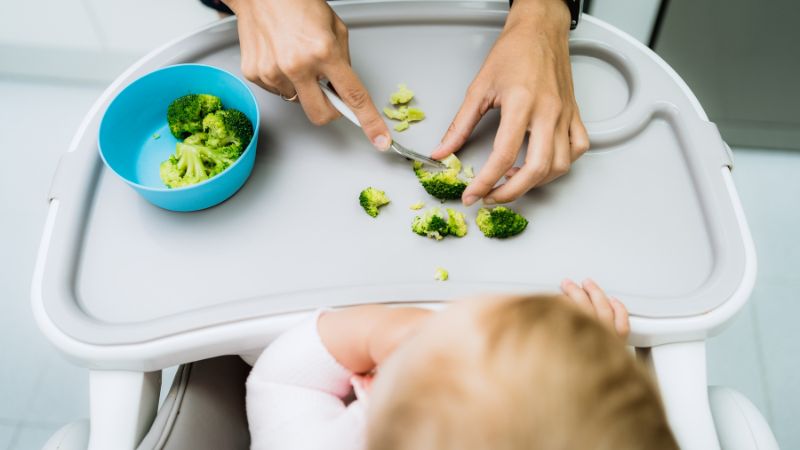Typically, children can start familiarizing themselves with food at 6 months old. However, many infants are often uncooperative, causing parents to struggle with feeding. Here are some helpful tips to make your baby eat more deliciously and solve the worry of the baby refusing to eat solid food!
1 Let the baby eat with the parents
You should arrange a seat at the dining table for the baby to sit and eat with the parents. When the baby sees there is a lot of food on the table and many people sitting around eating with the baby, it will help the baby be interested and eat more voluntarily.
Because young children tend to observe and imitate adults, so parents should eat deliciously so that the child feels the food that the mother cooks is delicious too.
 Let the baby eat with the parents
Let the baby eat with the parents
2 Create a happy environment, not distracted
Many children are uncooperative when eating, which makes mothers frustrated and scold the child, which in turn makes the child scared and refuse to eat, only crying. Therefore, it is best for mothers to try to create a cheerful atmosphere when feeding the child, so that the child’s mood becomes better and they will enjoy eating more.
In addition, young children are easily distracted by the surrounding environment, such as TV, phones, music, toys,… so parents should keep the child away from them when feeding, to help the child focus on exploring the flavors of the food.
 Create a happy environment, not distracted
Create a happy environment, not distracted
3 Don’t force-feed the baby
Many parents, when they see their child refusing to eat, forcefully shove the food into the baby’s mouth to make them eat. However, this not only makes the child scared but also becomes a traumatic experience every mealtime. Therefore, parents should not do this but find other ways to make it easier for the baby to eat.
If the baby doesn’t want to eat, turns their head, or pushes the spoon away, it may be a sign that they are full or not interested in the food. But if the baby cries when you take the food away, they may still be hungry, so you should feed them more.
 Don’t force-feed the baby
Don’t force-feed the baby
4 Don’t continuously spoon-feed
Continuously spoon-feeding the baby will not be beneficial; the baby will feel more uncomfortable rather than interested and may cry uncontrollably. Therefore, it is best to spoon-feed the baby slowly so that they can fully experience the taste of the food before continuing to feed.
 Don’t continuously spoon-feed
Don’t continuously spoon-feed
5 Don’t overfeed or let the baby be too hungry
If the baby has already breastfed and is full, there will be no need to eat any other solid food. Therefore, mothers should have a feeding schedule for their baby.
Avoid having the baby’s breastfeeding and meal times too close together, an adequate interval between meals is about 1.5-2 hours. Also, it is not advisable to feed the baby close to bedtime, as it will make the baby feel more tired rather than interested in eating.
Don’t overfeed or let the baby be too hungry
6 Experiment with different foods
In the early stage of starting solid food, parents do not know what the baby will like to eat, so mothers should observe and understand the expression each time they feed the baby with a certain food.
Experts recommend starting with smooth pureed food and then gradually transitioning to coarser textures.
 Experiment with different foods
Experiment with different foods
7 Try to relax when feeding
When a mother is stressed, she may appear frustrated and urge the child to eat more. However, you should know that young children may not be accustomed and need time to get used to eating solid food. Take your time and give your child the opportunity to explore the types of food they enjoy!
 Try to relax when feeding
Try to relax when feeding
Above are some helpful tips that will make it easier for mothers to introduce solid food to their baby. We hope this article will be useful to mothers with young children.
Source: Tổ quốc online newspaper




































